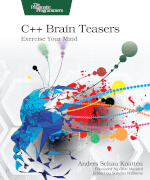You've answered 1 of 188 questions correctly. (Clear)
Question #129 Difficulty: 
According to the C++23 standard, what is the output of this program?
#include <vector>
#include <iostream>
int main() {
std::vector<char> delimiters = { ",", ";" };
std::cout << delimiters[0];
}
Correct!
Here we are trying to initialize a vector<char> using two string literals, not two chars.
The initializer-list constructor for template <class T>vector is defined as vector(initializer_list<T>) by §[vector.overview] in the standard. In our case, vector(initializer_list<char>).
The type of a string literal is "array of n const char" (§[lex.string]¶8), so clearly the initializer-list constructor is not a match.
This problem does however not result in a compiler error, since the compiler is able to find another constructor that matches!
§[over.match.list]¶1 explains the rules very clearly:
When objects of non-aggregate class type
Tare list-initialized (...), overload resolution selects the constructor in two phases:— If the initializer list is not empty or
Thas no default constructor, overload resolution is first performed where the candidate functions are the initializer-list constructors (§[dcl.init.list]) of the classTand the argument list consists of the initializer list as a single argument. [which we have seen didn't match].— Otherwise, or if no viable initializer-list constructor is found, overload resolution is performed again, where the candidate functions are all the constructors of the class T and the argument list consists of the elements of the initializer list. [in our case, the two string literals
","and";"].
Going back to §[vector.overview], we find this candidate:
template <class InputIterator> vector(InputIterator first, InputIterator last)
Note that the type of InputIterator has no link to the type of T in the vector<T>. So even if we are initializing a vector<char>, the two arguments can be of arbitrary type. The only requirement is that they confirm to the concept of InputIterator, which const char[] happens to do.
Now the constructor believes it has been passed two iterators to the same sequence, but it has actually been passed iterators to two completely different sequences, "," and ";". §[forward.iterators]¶2 says: "The domain of == for forward iterators is that of iterators over the same underlying sequence.". So the result of this program is undefined.
You can explore this question further on C++ Insights or Compiler Explorer!
Mode : Training
You are currently in training mode, answering random questions. Why not Start a new quiz? Then you can boast about your score, and invite your friends.
Contribute
C++ Brain Teasers
Get the book, support the site!
